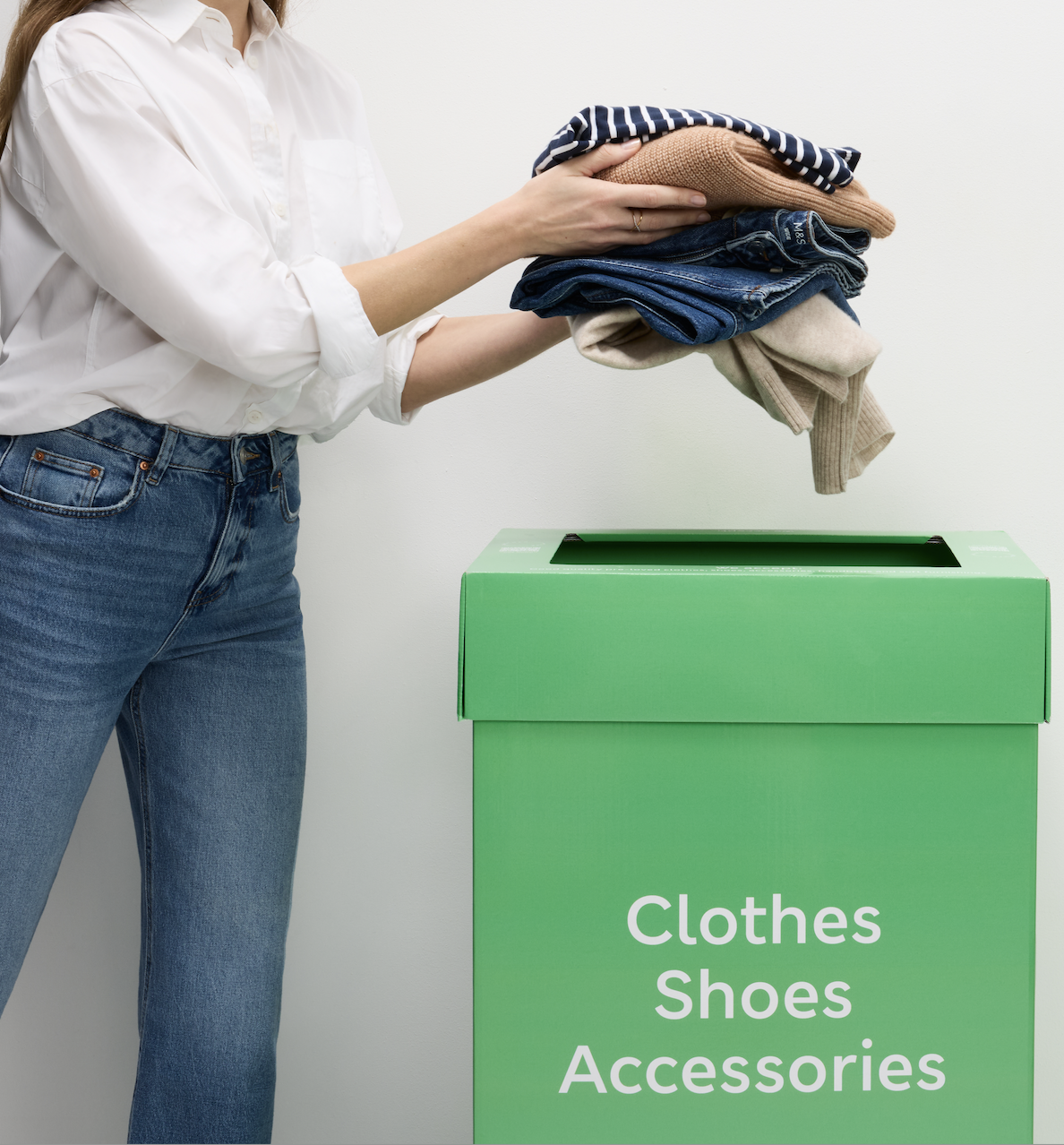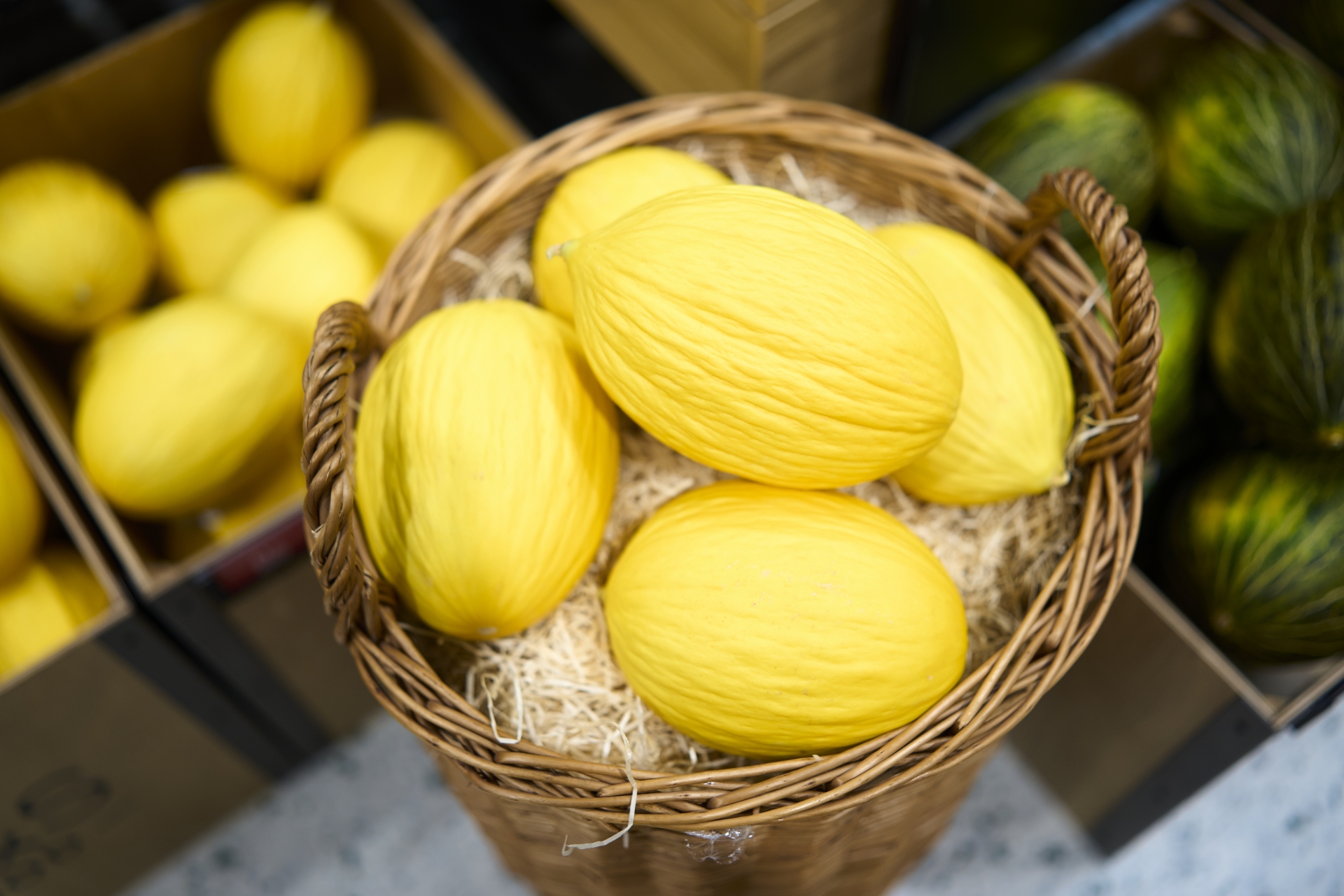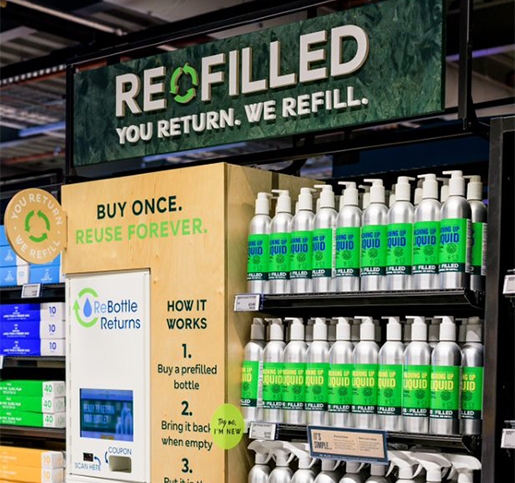
Our approach
We are playing our part in reducing single use plastic and pressing the accelerator on closed-loop recycling.
To help us work towards net zero, a circular economy and closed-loop recycling system we’ve set the following targets:
- 100% of our packaging to be recyclable by 2025.
- In Foods, we want to remove 1bn units of plastic by 2027, equating to a 30% reduction in the volume of plastic food packaging.
Our progress
In 2021, overall, a higher percentage of our packaging was recyclable than ever before, at 91%, up from 87% the previous year.
The year on year improvement was greater for plastic packaging specifically, which increased by 11% in 2021.
This is following the rollout of our plastic takeback scheme to more than 500 stores this year, which means customers can now easily recycle more of our plastic packaging, including ‘soft’ plastics that aren’t typically collected for recycling by UK local authorities, such as bags, films, pouches and wraps.
During the year 2021/22 we removed 75 million pieces of plastic from our Food business. Since 2018, we’ve removed over 3,000 tonnes of packaging in Foods, including removing plastic trays from vegetables such as broccoli, asparagus, and pears. We’ve also removed polystyrene from our pizza bases and all black plastic – which can be difficult to recycle – from our food halls. You’ll also notice we’ve started to replace some of our ready meal trays with alternative materials like foil.
To help cut down on packaging, we’ve rolled out over 70 loose produce lines following a successful trial at our Tolworth store, and we’re continuing to trial an additional 25 loose product lines at our test-and-learn renewal stores.
We’re also set to remove a further estimated 50 tonnes of plastic packaging by the end of 2022 by switching our teacake packaging from plastic film to widely recycled FSC accredited paper.
We’re rolling out fully recyclable on-the-vine tomato packaging. The new packaging replaces a hard-to-recycle plastic sleeve with fully recyclable cardboard - set to remove an estimated 6.3m pieces of plastic once rolled out by the end of the year.
Last year, M&S introduced fully recyclable packaging for its Mandagold tangerines, removing approximately 748,000 pieces of plastic, with more citrus lines, including blood oranges, available in the earth packaging later this year.
In Cards & Wrap, our wrapping paper is now cellophane-free and our Christmas cards, gift bags, gift tags and wrapping paper are made with FSC-certified paper and vegetable or water-based inks (not traditional petroleum-based inks).
The environment continues to be a major concern for customers, with M&S’s upcoming Family Matters Index, revealing it is a priority for 64% of UK families and 56% are making an effort to educate themselves about their own environmental impact. A vast majority (88%) agree supermarkets should use recyclable packaging where possible and 37% are already changing the food they buy due to climate change.
In Clothing & Home, we’ve removed 60m units of plastic since 2018 and we’re committed to continue reducing plastics in our products and supply chain.
In Womenswear, we’ve removed the plastic covers from the 500,000 cashmere jumpers we sell each year and saved 1.5m pieces of plastic by moving from a single hanger with a size pip to a 2pp waterfall hanger in our women’s leggings and joggers range.
In Menswear, we’ve removed 72,640 pieces of plastic from men’s merino and cashmere scarves and in spring 2022 we launched new formal shirts in our Sartorial range with reduced plastic by removing outer bags, replacing internal plastic clips with more sustainable options, and removing the spare plastic collar stays. Further plastic reductions to core ranges of non-iron shirts will be added in autumn-to-winter 2022.
In Lingerie, we’ve have removed 4m pieces of plastic in women’s knickers by choosing to display products on a table instead of hangers and 598,025 pieces of plastic have been removed from across all 2pp and 3pp ladies’ socks.
In Home, we have started to remove 3.2m units of plastic from our bedding and have removed 360,000 pieces of plastic from our bathmats. We’ve also replaced the protective plastic in our cutlery sets with lightweight tissue removing a further 259,000 units of plastic.
We’ve also removed 50m pieces of plastic from our supply chain. Our customers would not see the work we’re doing to reduce plastic behind the scenes but we are committed to doing the right thing.
For more information about plastics and packaging reporting, see pages 13, 30 and 31 of our Sustainability Report 2022.
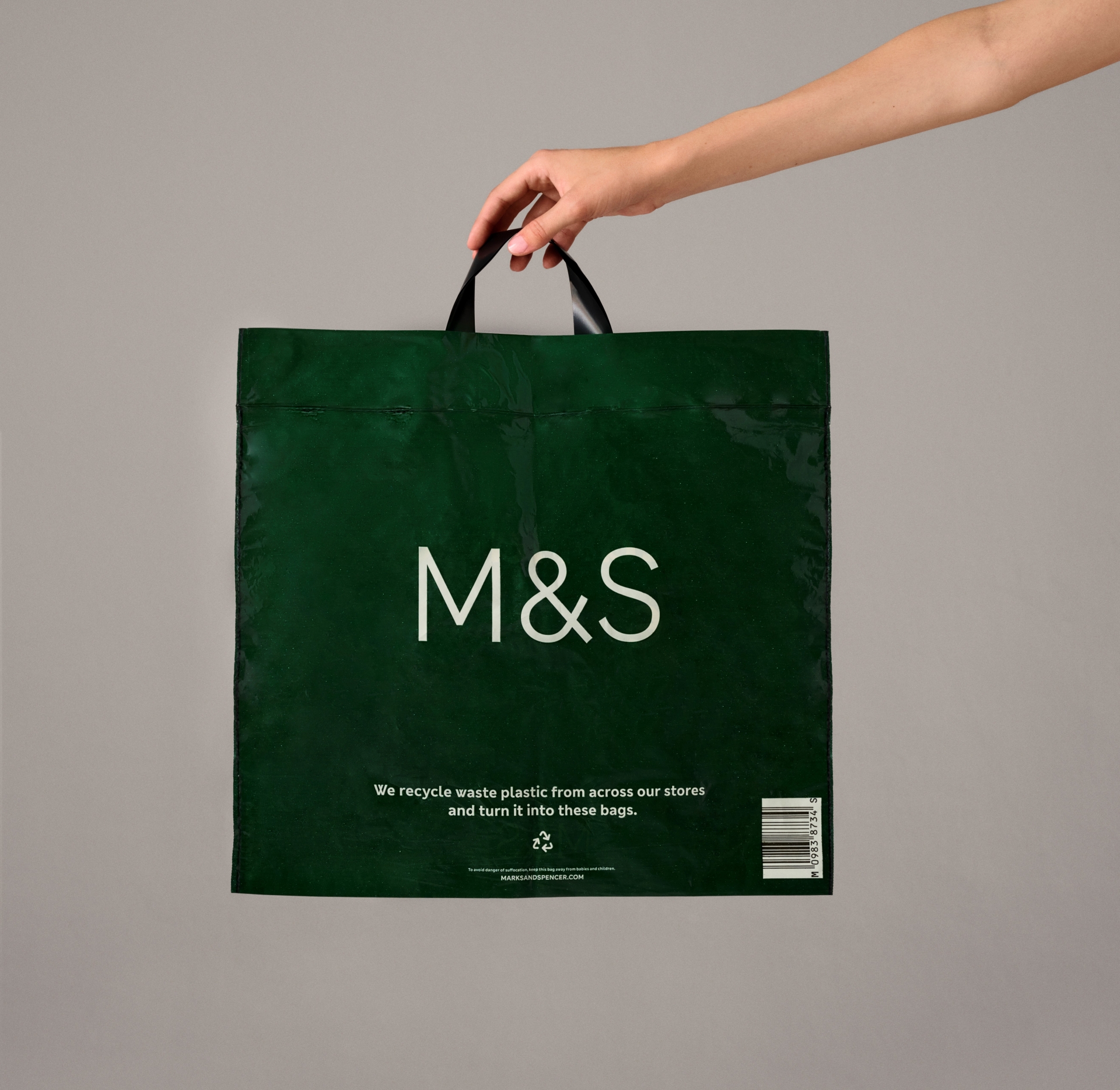
Carrier Bags
Our customers expect us to do the right thing and make the most sustainable choices on their behalf. We encourage our customers to use fewer bags and reuse the bags that they already own.
But for those times when you forget your reusable bag, we sell 100% recycled plastic Bags for Life - made from plastic waste collected in our own stores. At M&S you can return your Bag for Life for replacement or recycling when they wear out.
We were the first retailer to charge for single-use plastic bags in 2008 and, since then, our carrier bag usage has declined by 90%. We no longer offer single-use shopping bags, and have also removed plastic single-use small produce bags from our Foodhalls.
We are led by science and aim to do the right thing for the environment. For carrier bags, scientific opinion overwhelmingly considers that the correct choice is to use a closed-loop bag and encourage maximum reuse.
Online packaging
When it comes to our online packaging, we want to deliver great products to our customers, provide a seamless shopping experience, and ensure sustainability is at the forefront of this process.
Our current green bag used to package products is made from 100% recycled plastic and is fully recyclable via our plastic takeback scheme, which accepts all types of plastic that some local authorities will not collect. We’ve just switched to paper tape, instead of plastic, on our cardboard boxes – saving 2,781,000 metres annually. Our cardboard boxes are 100% recyclable and can be put in your waste recycling bins at home.
However, we realise we need to do more – for the planet and our customers. That’s why we are currently trialling more sustainable online order packaging solutions for both home delivery and click-and-collect. We will be monitoring feedback over the coming months with hope to roll out the best solution as soon as possible.
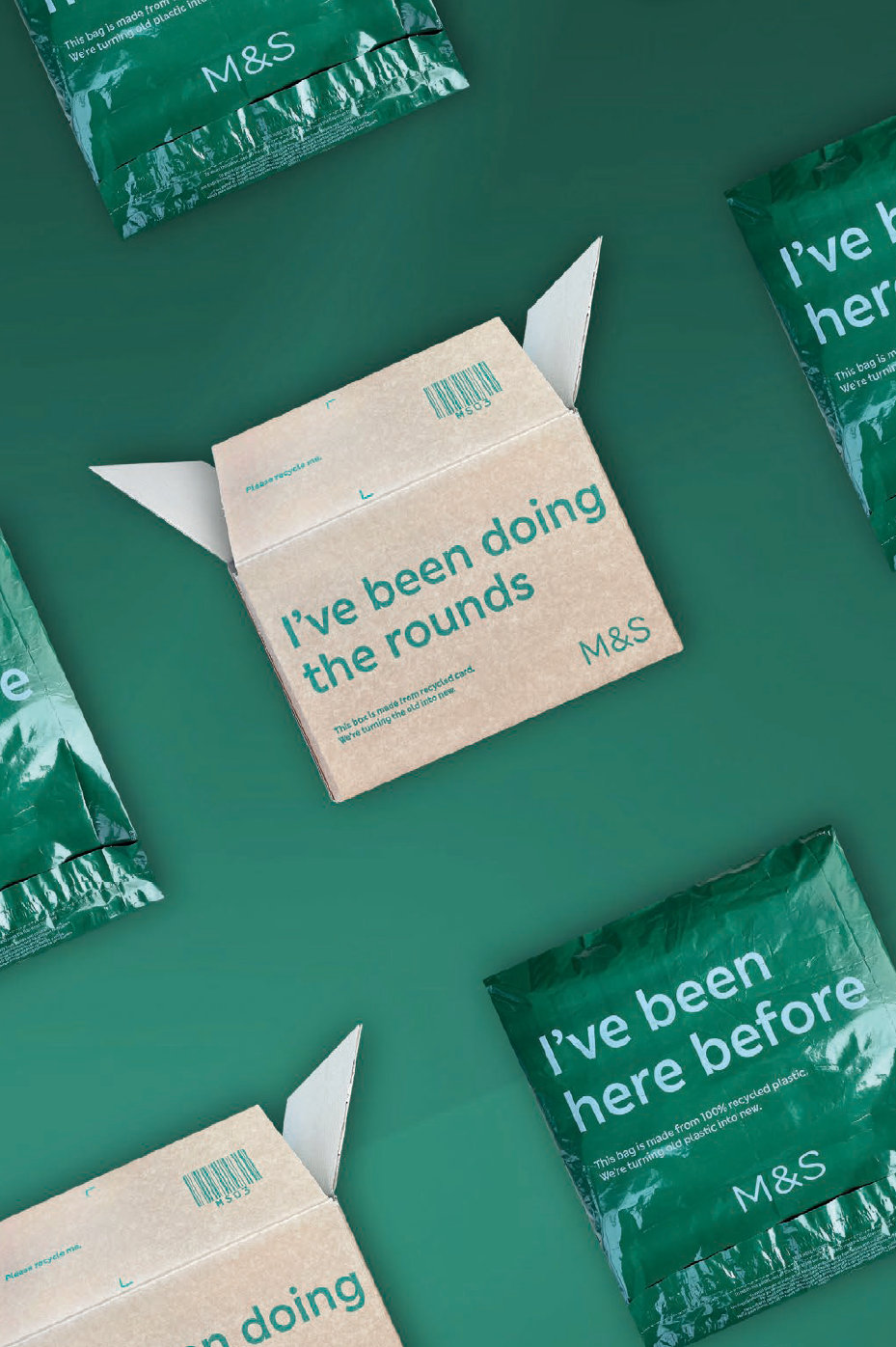
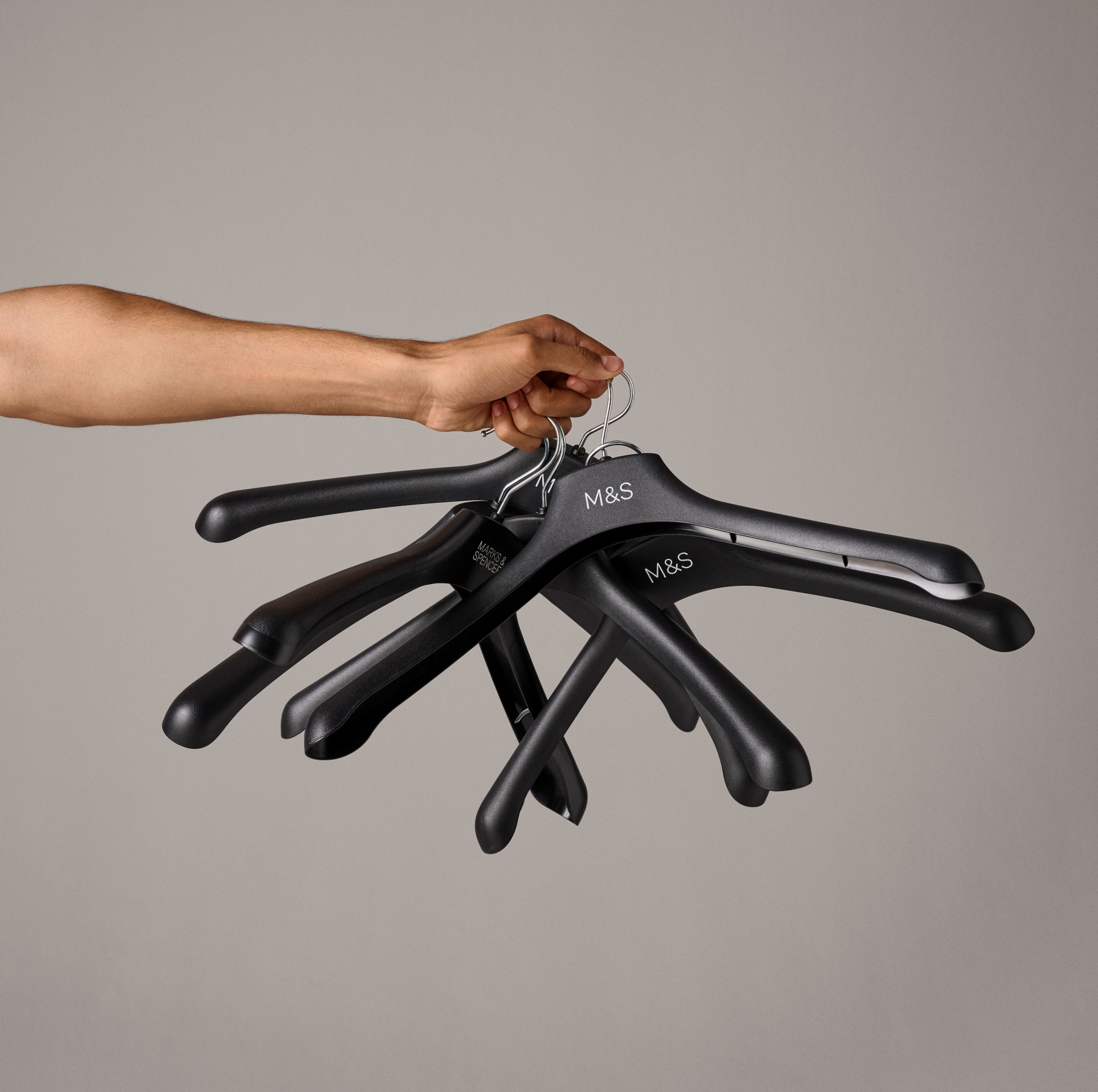
Hangers
At M&S, we're proud to run a closed-loop hanger reuse programme that supports circularity and helps reduce plastic waste. When customers purchase clothing in our stores, we request customers to remove the M&S hanger at the till to keep it within our reuse and recycling system.
To make this easy, hanger collection boxes are placed under all tills, both self-service and manned, in every store. These boxes are exclusively for M&S-branded hangers, which are either sent back to our garment suppliers for reuse or recycled into new hangers.
Since launching the scheme in 2007, our customers have helped us divert over 1 billion hangers from landfill. M&S was the first retailer to implement a 12-month UK ‘coat hanger amnesty': customers could take any unwanted plastic coat hangers into any participating stores for recycling.
Today, around 45% of the hangers collected are reused within our supply base, with the remainder recycled.
Thank you for supporting our efforts to close the loop and reduce plastic waste.
Plastic Take Back
As we deliver on our commitment to become a net zero business across our entire supply chain by 2040, we want to help our customers reuse and recycle as much as possible.
We understand some types of plastic are difficult to recycle at home, for example crisp packets, yoghurt lids, sweet wrappers, multi-pack clothing bags and hangers, so we have introduced dedicated plastic collection facilities at all of our stores in the UK and Ireland.
As part of our plan to reduce our use of plastic and create a circular economy where we reuse and recycle as much as possible, we’ve rolled out our in-store Plastic Takeback Scheme to all M&S owned stores. Customers can easily return plastic packaging from any product by placing it into our clearly marked plastic collection units at their nearest store.
In Beauty we are working on a solution what would allow the customer to send back for recycling beauty packaging bought online.

In December 2019, we launched our packaging-free, refillable grocery concept, ‘Fill Your Own’, offering 60 lines of refillable groceries, including pasta, rice, cereal, and nuts.
Prior to the pandemic, our review of the success of the concept found that more than 40% of our Fill Your Own products outsell the packaged versions.
Based on this evidence, we have expanded the concept to a total of 15 stores in 2022. We want to expand the concept to more stores and our focus for the future is to improve the operational efficiency of the scheme, upgrade the range of products available and improve the customer experience.
We’re also trialling other refillable concepts in different product categories. ‘Refilled’ offers our customers a refillable cleaning and laundry range. The trial was launched in two stores in April and we will also begin a refillable water trial in summer 2022. If these prove successful, our aim is to expand the concepts further.
We support UK Government plans to improve the UK’s recycling system and incentivise businesses to use more environmentally friendly or recyclable materials, and to ensure all our plastic gets recycled here in the UK. We’re also teaming up with businesses and NGOs to encourage change across the wider retail industry and supply chain, including signing up to the UK Plastics Pact.


